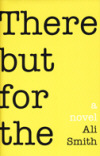There But for The
Readers who love word play, such as puns, and prefer a nonlinear structure for the surprises it brings will find prize-winning Scottish novelist Ali Smith’s There But For The amusing and insightful.
Readers who love word play, such as puns, and prefer a nonlinear structure for the surprises it brings will find prize-winning Scottish novelist Ali Smith’s There But For The amusing and insightful.
What plot there is involves a dinner guest who doesn’t leave, and each word of the title is a section, giving the perspective of a person who knows this guest slightly yet meaningfully. Miles Garth is the extra dinner guest (brought by an invited guest, Mark) who before the dessert course leaves the table to lock himself in the spare bedroom upstairs. The first of the four narrators in the THERE section is a Scotswoman, Anna Hardie, who met Miles as a teenager on a winning writers’ trip through Europe. She claims they didn’t have much to do with each other, but then she remembered that Miles brought her out of her shell, though he calls her Anna “K,” not her name. The BUT section is Mark’s story—he met Miles at a play, where Miles impressed Mark with his wit. The FOR section is the elderly May Young’s story; she is the mother of a dead woman whom Miles loved. Even after the daughter’s death, Miles keeps up with May all through the years. The THE section belongs to Brooke Bayoude, a precocious 9-year-old, the other non-invited dinner guest, who seems to understand Miles the best.
Miles’ disappearance upstairs follows very funny but also cruel exchanges by the dinner guests, and during his several months’ long stay upstairs, he becomes a celebrity, and various groups (The Milo Multitude, The Milo Masses) congregate under his window claiming his affiliation with their groups, like “Milo for Palestine.” Newspapers call it Milo Madness, Milo Mania, Milo Mayhem—an amusing social commentary here, which includes the hostess’ change of mind into making money on Miles living in her spare room. Mostly, however, the novel’s humor comes from word play:
I said, I’m Brooke, the child said, and then you said, what a coincidence, I’m Brooke too.
No, Anna said. The thing is, when we met on the steps, I didn’t know you were saying the word Brooke, I thought you were saying the word broke. And I’m broke. So I said, me too. It’s a pun.
Like, broken? the child said.
No, I meant it in the sense of having no money, Anna said.
What exactly is a pun therefore? the child said.
What exactly is a pun there for? Anna said.
Anna used to work for The Center for Temporary Permanence, a title which reversed
becomes “permanent temporariness”—like Miles’ stay and the characters’ tentative relationships. The reader has to work at understanding connections, as do these characters (Anna’s forgetting Miles’ important role during their trip, for example). And nothing is fully seen or developed straight up front. This is best explained by Miles’ preference for the word “but”:
Yeah, but the thing I particularly like about the word but, now that I think about it, is that it always takes you off to the side, and where it takes you is always interesting.
………………………
But
………………………
is very occasionally a preposition but is mostly a conjunction,
and the word conjunction. . . means:
connection
union
combination
simultaneous occurrence in space and time
Thus the setting of this novel, Greenwich, the center of timekeeping, is important. The kind of word play that connects everything involves clocks as well. Brooke reads a secondhand book, which leads her father to say:
Yep . . . it’s second hand. Second hand! this was funny. First: because of the clocks and watches at the Observatory in the museum which have second hands, and second: in a sort of weird way because of the man with the hand [who tried to bomb the Greenwich Observatory] that exploded off his arm.
The reader, with this darker bomb reference, is reminded that this book is not just knock-knock jokes and word play but also reveals sad pasts—May’s and Mark’s particularly, but even Brooke’s at being tormented by her school teacher. The reader must remember what is left out of the phrase “There but for the grace of God go I,” and then note that the I may be shared by the four narrators; the question of God’s grace Brooke addresses, though she cannot resolve its meaning. The novel’s serious parts show, in our contemporary society’s casual cruelty, impermanent relationships, which should not be forgotten since they are all we have. Characters, though not thoroughly known, are still sympathetic, Miles particularly, as a man of a few but good words. The reader must wait for explanations of mysteries late in the novel. But the rewards are that the book is funny, moving, and often thought-provoking.





